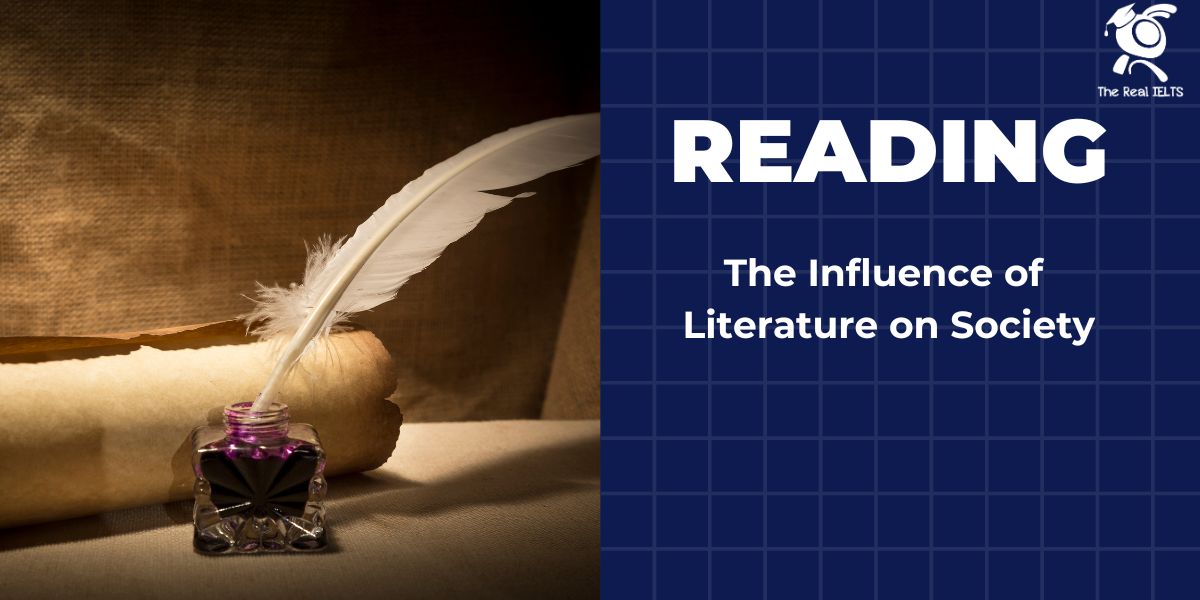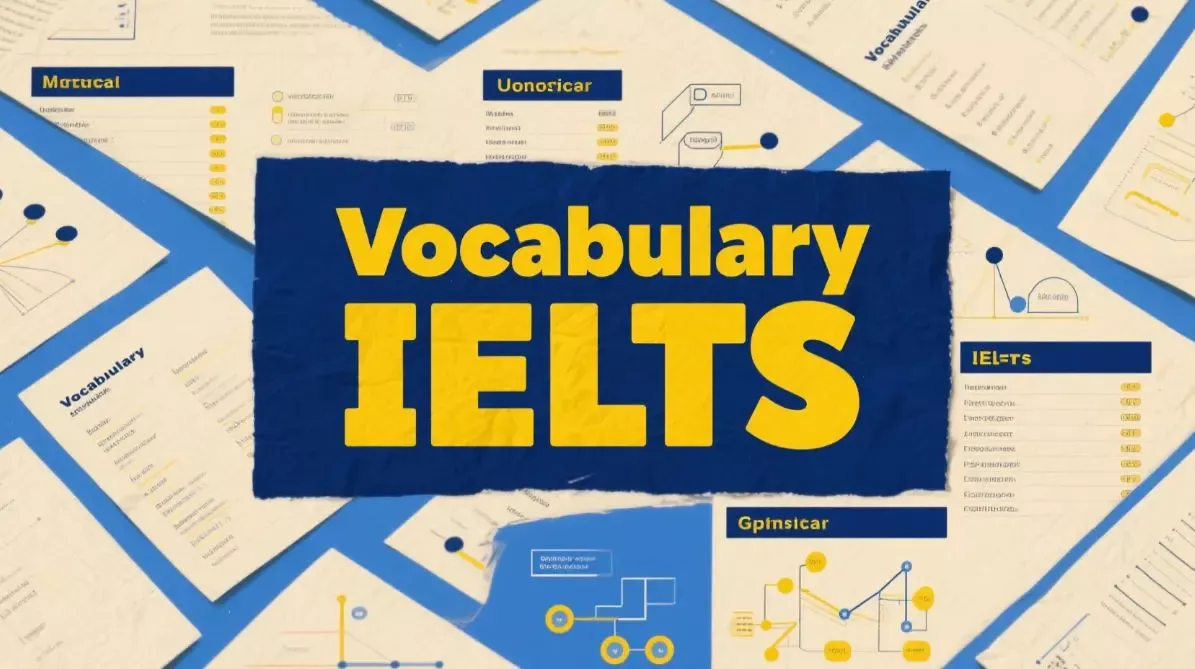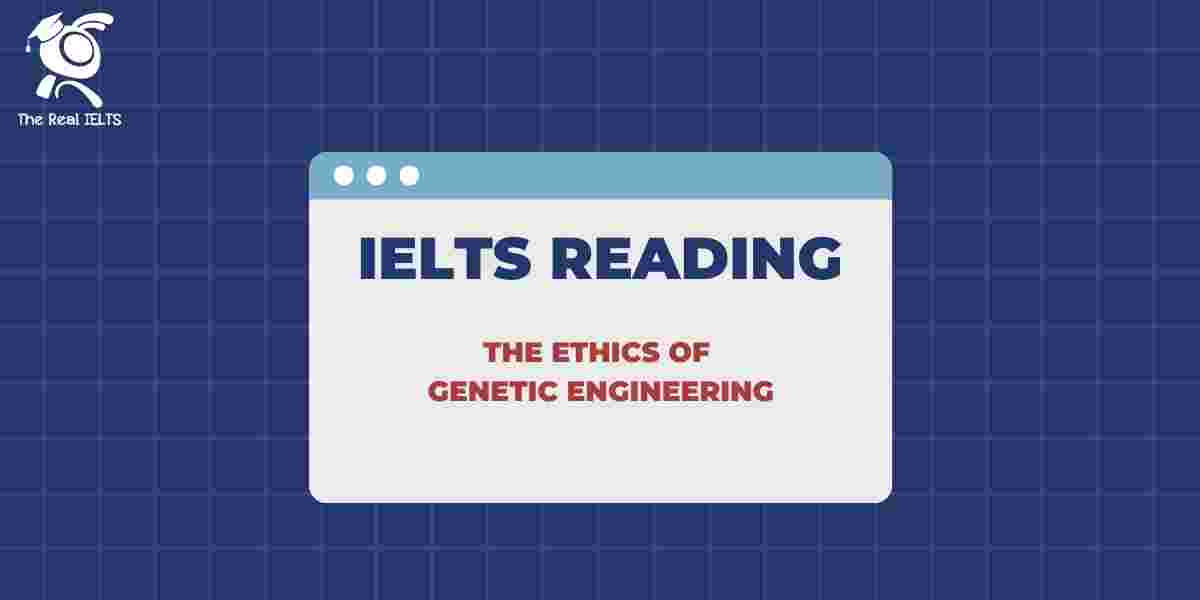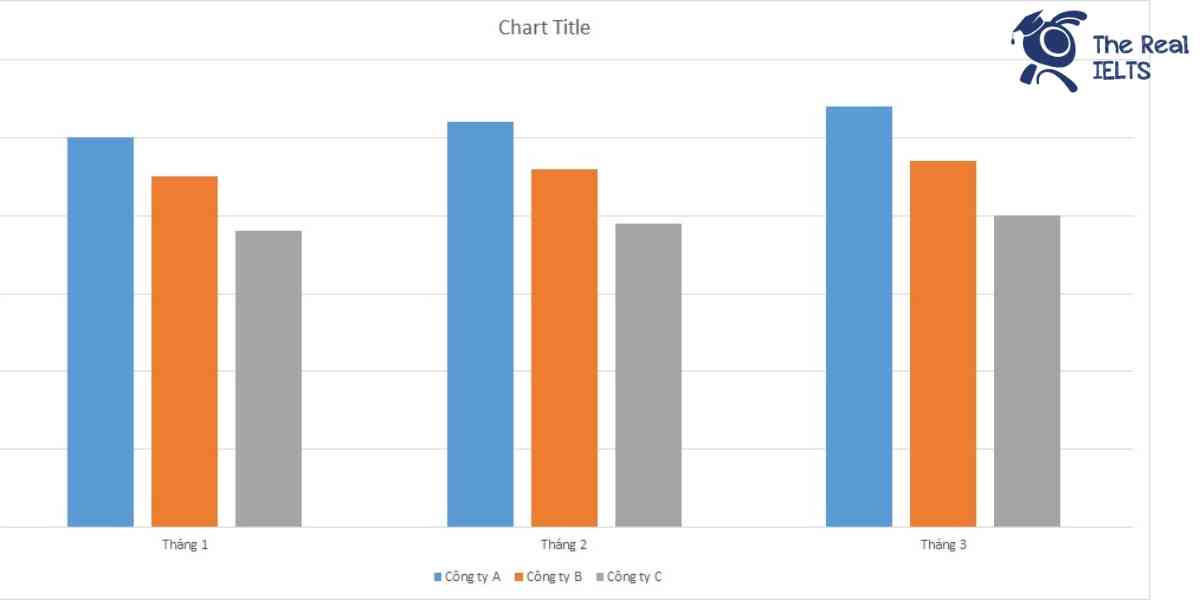“Ảnh hưởng của văn học đối với xã hội” (The Influence of Literature on Society) là một chủ đề thiên về Xã Hội Học. Chủ đề này nếu Writing thì sẽ khá khó nhưng nếu là Reading thì sẽ dễ thở hơn một chút.
The Influence of Literature on Society
Introduction: Literature has always played a significant role in shaping societies throughout history. From ancient epics to modern novels, literature has been a mirror reflecting the values, beliefs, and struggles of various cultures. In this reading, we delve into the profound impact literature has on society, exploring how it shapes perspectives, inspires change, and fosters cultural evolution.
1. Shaping Perspectives: Literature serves as a lens through which individuals perceive the world. By presenting diverse characters, settings, and narratives, it broadens readers’ perspectives, fostering empathy and understanding across different cultures, experiences, and viewpoints. For example, novels like Harper Lee’s “To Kill a Mockingbird” challenge societal prejudices by inviting readers to empathize with characters facing discrimination, thus encouraging introspection and empathy.
2. Inspiring Change: Throughout history, literature has been a catalyst for social and political change. Writers often use their craft to critique injustices and advocate for reform. Works such as George Orwell’s “1984” and Upton Sinclair’s “The Jungle” have sparked movements and influenced public discourse by exposing societal flaws and envisioning alternative futures. By shedding light on pressing issues, literature galvanizes readers to question the status quo and strive for a better world.
3. Fostering Cultural Evolution: Literature preserves cultural heritage while also driving cultural evolution. Through storytelling, folklore, and mythology, societies pass down their values, traditions, and collective memories from generation to generation. Moreover, literature adapts to societal changes, reflecting shifting norms, attitudes, and aspirations. For instance, the Harlem Renaissance in the early 20th century gave voice to African American experiences, challenging racial stereotypes and reshaping the American literary landscape.
Conclusion: In conclusion, literature exerts a profound influence on society by shaping perspectives, inspiring change, and fostering cultural evolution. As we navigate the complexities of the modern world, the power of literature to illuminate truths, provoke thought, and ignite imagination remains as potent as ever. By engaging with diverse literary works, we enrich our understanding of ourselves and the world around us, ultimately contributing to a more enlightened and compassionate society.
Câu hỏi
- What role does literature play in shaping societies, according to the reading?
- How does literature broaden readers’ perspectives, as mentioned in the reading?
- Give an example of a novel mentioned in the reading that challenges societal prejudices.
- How does literature inspire social and political change, according to the reading?
- Provide examples of literary works that have sparked movements or influenced public discourse.
- In what ways does literature foster empathy and understanding across different cultures?
- How does literature contribute to cultural evolution, according to the reading?
- What is meant by the term “cultural heritage” as it relates to literature?
- How does literature reflect shifting norms and attitudes within society?
- Describe the significance of the Harlem Renaissance mentioned in the reading.
- What is the main argument presented in the conclusion of the reading?
- How does literature illuminate truths about the human condition, according to the reading?
- Discuss the role of folklore and mythology in preserving cultural values.
- What are some ways in which literature engages readers in questioning the status quo?
- How does literature contribute to a more enlightened and compassionate society?
- Explain how the characters in “To Kill a Mockingbird” challenge societal prejudices.
- Compare the impact of “1984” and “The Jungle” on societal awareness, as mentioned in the reading.
- How does literature serve as a mirror reflecting the values and struggles of different cultures?
- Discuss the relevance of literature in contemporary society, based on the reading.
- In what ways can individuals enrich their understanding of the world by engaging with diverse literary works?
Trả lời
- Literature plays a significant role in shaping societies by reflecting and influencing cultural values, beliefs, and struggles.
- Literature broadens readers’ perspectives by presenting diverse characters, settings, and narratives that foster empathy and understanding.
- An example of a novel mentioned in the reading that challenges societal prejudices is “To Kill a Mockingbird” by Harper Lee.
- Literature inspires social and political change by critiquing injustices and advocating for reform.
- Examples of literary works that have sparked movements or influenced public discourse include “1984” by George Orwell and “The Jungle” by Upton Sinclair.
- Literature fosters empathy and understanding across different cultures by inviting readers to empathize with characters from diverse backgrounds.
- Literature contributes to cultural evolution by preserving cultural heritage and adapting to societal changes.
- The term “cultural heritage” refers to the traditions, values, and collective memories passed down through literature and other cultural artifacts.
- Literature reflects shifting norms and attitudes within society through its portrayal of characters, themes, and settings.
- The Harlem Renaissance was a cultural movement in the early 20th century that gave voice to African American experiences and reshaped the American literary landscape.
- The main argument presented in the conclusion of the reading is that literature’s power to illuminate truths, provoke thought, and ignite imagination remains potent in shaping society.
- Literature illuminates truths about the human condition by exploring universal themes such as love, loss, and redemption.
- Folklore and mythology preserve cultural values by passing down stories and traditions from generation to generation.
- Literature engages readers in questioning the status quo by presenting alternative perspectives and critiquing societal norms.
- Literature contributes to a more enlightened and compassionate society by fostering empathy, understanding, and critical thinking.
- The characters in “To Kill a Mockingbird” challenge societal prejudices by confronting racism and injustice in a small Southern town.
- “1984” and “The Jungle” have had significant impacts on societal awareness by exposing political oppression and labor exploitation, respectively.
- Literature serves as a mirror reflecting the values, struggles, and aspirations of different cultures throughout history.
- Literature remains relevant in contemporary society as it continues to address pressing issues, inspire change, and shape cultural discourse.
- Individuals can enrich their understanding of the world by engaging with diverse literary works that offer insights into different cultures, perspectives, and experiences.
Phần song ngữ
The Influence of Literature on Society
Tầm Ảnh Hưởng của Văn Học đối với Xã Hội
Introduction: Literature has always played a significant role in shaping societies throughout history. From ancient epics to modern novels, literature has been a mirror reflecting the values, beliefs, and struggles of various cultures. In this reading, we delve into the profound impact literature has on society, exploring how it shapes perspectives, inspires change, and fosters cultural evolution.
Giới thiệu: Văn học luôn đóng vai trò quan trọng trong việc hình thành xã hội suốt lịch sử. Từ những thiên epic cổ đại đến những cuốn tiểu thuyết hiện đại, văn học là một chiếc gương phản ánh các giá trị, niềm tin và cuộc đấu tranh của các nền văn hóa khác nhau. Trong bài đọc này, chúng ta sẽ khám phá tầm ảnh hưởng sâu sắc của văn học đối với xã hội, nghiên cứu cách nó hình thành quan điểm, truyền cảm hứng thay đổi và thúc đẩy tiến hóa văn hóa.
1. Shaping Perspectives: Literature serves as a lens through which individuals perceive the world. By presenting diverse characters, settings, and narratives, it broadens readers’ perspectives, fostering empathy and understanding across different cultures, experiences, and viewpoints. For example, novels like Harper Lee’s “To Kill a Mockingbird” challenge societal prejudices by inviting readers to empathize with characters facing discrimination, thus encouraging introspection and empathy.
1. Hình Thành Quan Điểm: Văn học là một công cụ giúp mở rộng cái nhìn của cá nhân về thế giới xung quanh. Bằng cách trình bày các nhân vật, bối cảnh và câu chuyện đa dạng, nó mở rộng quan điểm của độc giả, khuyến khích sự đồng cảm và hiểu biết qua các nền văn hóa, trải nghiệm và quan điểm khác nhau. Ví dụ, các cuốn tiểu thuyết như “Giết con chim nhại” của Harper Lee đã thách thức những định kiến xã hội bằng cách mời gọi độc giả cảm thông với các nhân vật đối diện với sự phân biệt đối xử, từ đó khuyến khích sự tự sự nhìn và đồng cảm.
2. Inspiring Change: Throughout history, literature has been a catalyst for social and political change. Writers often use their craft to critique injustices and advocate for reform.
2. Truyền Cảm Hứng Thay Đổi: Suốt lịch sử, văn học đã là nguồn gốc của sự thay đổi xã hội và chính trị. Các nhà văn thường sử dụng tài năng của mình để phê phán các bất công và thúc đẩy các cải cách.
Works such as George Orwell’s “1984” and Upton Sinclair’s “The Jungle” have sparked movements and influenced public discourse by exposing societal flaws and envisioning alternative futures. By shedding light on pressing issues, literature galvanizes readers to question the status quo and strive for a better world.
Các tác phẩm như “1984” của George Orwell và “Khu rừng” của Upton Sinclair đã làm nổ ra các phong trào và ảnh hưởng đến cuộc trao đổi công cộng bằng cách tiết lộ các khuyết điểm xã hội và mô tả tương lai khác biệt. Bằng cách làm sáng tỏ những vấn đề cấp thiết, văn học kích thích người đọc nghi ngờ tình trạng hiện tại và phấn đấu cho một thế giới tốt đẹp hơn.
3. Fostering Cultural Evolution: Literature preserves cultural heritage while also driving cultural evolution. Through storytelling, folklore, and mythology, societies pass down their values, traditions, and collective memories from generation to generation.
3. Thúc Đẩy Tiến Hóa Văn Hóa: Văn học bảo tồn di sản văn hóa trong khi cũng thúc đẩy sự tiến hóa văn hóa. Thông qua việc kể chuyện, truyền thống dân gian và thần thoại, các xã hội truyền đạt giá trị, truyền thống và ký ức tập thể của mình qua các thế hệ.
Moreover, literature adapts to societal changes, reflecting shifting norms, attitudes, and aspirations. For instance, the Harlem Renaissance in the early 20th century gave voice to African American experiences, challenging racial stereotypes and reshaping the American literary landscape.
Hơn nữa, văn học thích ứng với sự thay đổi của xã hội, phản ánh các chuẩn mực, thái độ và hoài bão đang thay đổi. Ví dụ, Phong trào Harlem Renaissance vào đầu thế kỷ 20 đã đem lại giọng điệu cho những trải nghiệm của người Mỹ gốc Phi, thách thức các định kiến chủng tộc và tái tạo cảnh văn học Mỹ.
Conclusion: In conclusion, literature exerts a profound influence on society by shaping perspectives, inspiring change, and fostering cultural evolution. As we navigate the complexities of the modern world, the power of literature to illuminate truths, provoke thought, and ignite imagination remains as potent as ever. By engaging with diverse literary works, we enrich our understanding of ourselves and the world around us, ultimately contributing to a more enlightened and compassionate society.
Kết Luận: Tóm lại, văn học có ảnh hưởng sâu sắc đối với xã hội bằng cách hình thành quan điểm, truyền cảm hứng thay đổi và thúc đẩy tiến hóa văn hóa. Khi chúng ta điều hướng qua các phức tạp của thế giới hiện đại, sức mạnh của văn học để làm sáng tỏ sự thật, khuyến khích suy nghĩ và khơi gợi trí tưởng tượng vẫn mạnh mẽ như ngày nào. Bằng cách tương tác với các tác phẩm văn học đa dạng, chúng ta làm phong phú thêm hiểu biết về chính mình và thế giới xung quanh, từ đó góp phần vào một xã hội thông thái và tràn đầy lòng trắc ẩn.
Đọc lại bài Reading cũ: Reading Skill Part 9: The Importance of Preserving Cultural Heritage.














